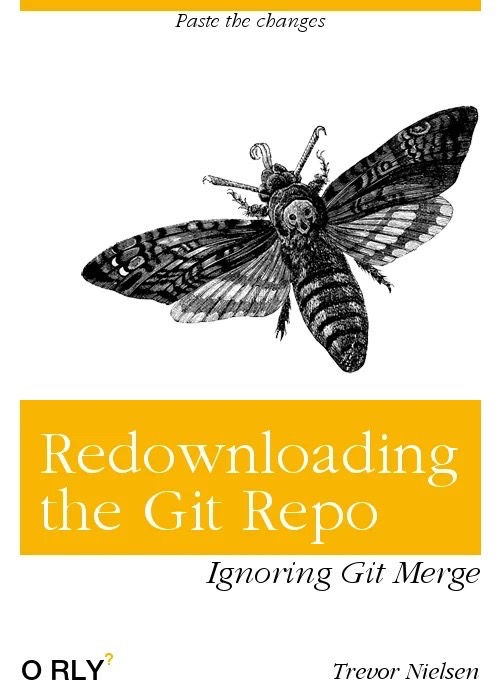
In the vibrant yet often chaotic world of Devtopia, where the code flows as freely as the coffee in the myriad of cafes lining its digital streets, there emerged a practice both pragmatic and perilous: "Redownloading the Git Repo." This ritual, born of frustration and the relentless pursuit of progress, became a hallmark of those daring enough to sidestep the labyrinthine complexities of Git merge conflicts.
At the heart of this narrative is Jordan, a developer whose journey through the vast repositories of Devtopia was marked by ambition, innovation, and a stubborn refusal to be hindered by mere technicalities. Jordan, like many before them, viewed Git not just as a tool for version control but as a medium through which the art of coding was both preserved and propagated.
However, as is often the case in the realm of development, Jordan's path was fraught with challenges. The most daunting of these was the Git merge conflict, a beast of binary contention that reared its head whenever disparate strands of code sought to occupy the same digital space. It was during these encounters that Jordan, armed with a blend of ingenuity and impatience, chose a route less conventional: "Paste the changes | Ignoring Git Merge."
This approach, as unorthodox as it was effective, involved the ritualistic redownloading of the entire Git repository, a fresh canvas upon which the changes of yore could be painstakingly reapplied. This process, though laborious, was seen by Jordan as a preferable alternative to navigating the arcane commands and potential pitfalls of resolving merge conflicts directly within Git.
"Redownloading the Git Repo: Paste the changes | Ignoring Git Merge" became Jordan's mantra, a strategy employed with such frequency that it soon caught the attention of their peers. To some, Jordan's method was a stroke of genius, a hack that sidestepped the need for intricate Git knowledge. To others, it was a reckless gambit, one that eschewed the very purpose of version control and opened the door to an array of potential issues, from the loss of code to the duplication of effort.
Yet, undeterred by the chorus of skepticism and admiration alike, Jordan pressed on. The practice, though not without its perils, allowed them to maintain a pace of development that few could match. Project after project, repository after repository, Jordan's method of handling Git conflicts became a legend in Devtopia, a testament to the developer's relentless pursuit of efficiency, even in the face of potential chaos.
Over time, however, even Jordan began to see the limitations of their approach. The accumulation of small discrepancies, the occasional loss of crucial changes, and the ever-present threat of code divergence prompted a period of reflection. It was through this introspection that Jordan came to appreciate the value of understanding and mastering Git's more nuanced functionalities, recognizing that the tools of version control, when wielded with expertise, offered not just a means to manage code but to collaborate and innovate on a scale previously unimagined.
And so, "Redownloading the Git Repo: Paste the changes | Ignoring Git Merge" evolved from a tale of defiance to a parable of growth. It served as a reminder to the denizens of Devtopia that while innovation and efficiency are virtues to be cherished, they must not come at the cost of understanding and mastering the fundamentals. Jordan's journey, once a beacon of expediency, became a lesson in the importance of balance—between the allure of shortcuts and the enduring value of deep, technical proficiency.